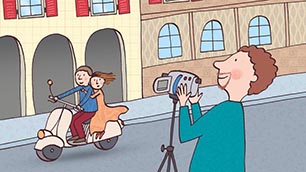| Silvia: | Now that we know what the present tense of the verbo avere looks like, we can use it to form some idiomatic expressions. This can be a little tricky for an English speaker. In fact, while in English expressions are generally formed with the verb “to be” followed by an adjective, in Italian we use avere followed by a noun. To describe our feelings, for example, we use the verbo avere. We have already mentioned avere paura. |
| Connor: | Right. Connor ha paura about the primo appuntamento. Io ho paura. |
| Silvia: | Esatto. Un’altra espressione è avere bisogno di, which means “to need”. |
| Connor: | So, we need money would be... abbiamo bisogno di soldi? |
| Silvia: | Sì, avete bisogno di un cinema e avete bisogno di soldi to buy it. |
| Connor: | Mr. Mark ha bisogno di sell the cinema. |
| Silvia: | Looks like he does! Un’altra espressione è avere voglia di which means “to feel like” or “to want”. Hai voglia di... che cosa, Connor? |
| Connor: | Ho voglia di open my agenzia di viaggi very soon! Ho voglia di avere molti clienti! |
| Silvia: | You will, sono sicura. |
| Connor: | Grazie, Silvia. I think that people hanno bisogno di essere felici e io ho voglia di make them felici! Am I right? |
| Silvia: | Perfetto, Connor! Actually, you can use an expression to say “to be right”! Italians say avere ragione. |
| Connor: | Io ho ragione? |
| Silvia: | Tu hai ragione! |
| Connor: | I am learning a lot of things oggi! Ho voglia di learn more! |
| Silvia: | Certo! To ask “how old are you” we say something whose literal translation would sound like “how many years do you have?” Funny, ho ragione? |
| Connor: | Sì, molto funny! Let me try to translate that... So, how è quanti... years è anni... to have è avere... |
| Silvia: | I am impressed! So, if I ask you: quanti anni hai? How would you answer? |
| Connor: | Io ho 28 anni. |
| Silvia: | Bravo! Your turn. |
| Connor: | Quanti anni ha your dog? |
| Silvia: | Ha 5 anni. Quanti anni ha the cinema? |
| Connor: | Ha 83 anni, Silvia! Like nonno Giovanni! È un sign! |
| Silvia: | Hai ragione, è un segno of fate! But tu hai pazienza? Can you wait? |
| Connor: | What is avere pazienza? |
| Silvia: | To be patient... |
| Connor: | Ah! Non ho pazienza, but... ho bisogno di avere pazienza, molta pazienza. |
| Silvia: | Patience is a virtue, as we say in italiano, la pazienza è una virtù! |
| Connor: | Ci sono momenti that io non ho any pazienza! |
| Silvia: | Quali sono? |
| Connor: | Sono due, when I feel sleepy and when I am hungry! |
| Silvia: | Quando hai sonno e quando hai fame. That’s understandable, io sono come te. |
| Connor: | Tu hai fame, now? |
| Silvia: | No, non ho fame but ho voglia di cioccolato! |
| Connor: | Noi non abbiamo fame, but abbiamo bisogno di un caffè! |
| Silvia: | Why? |
| Connor: | Because abbiamo sonno! And I cannot go to my appointment being sleepy, ho ragione? |
| Silvia: | You are wrong, tu hai torto. |
| Connor: | I am wrong? Ho torto? |
| Silvia: | I am kidding! |





















